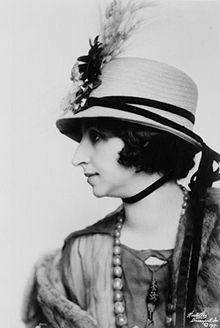Amelita Galli-Curci
| Amelita Galli-Curci | |
|---|---|
 |
|
| Born |
Amelita Galli November 18, 1882 Milan, Italy |
| Died | November 26, 1963 (aged 81) La Jolla, California, U.S. |
| Education | Milan Conservatory |
| Occupation | Opera singer |
| Known for | Coloratura soprano |
| Spouse(s) | Luigi Curci Homer Samuels |
Amelita Galli-Curci (18 November 1882 – 26 November 1963) was an Italian coloratura soprano. She was one of the most popular operatic singers of the 20th century, with her recordings selling in large numbers.
She was born as Amelita Galli into an upper-middle-class family in Milan, where she studied piano at the Milan Conservatory, winning a gold medal and at the age of 16 was offered a professorship. She was inspired to sing by her grandmother. Operatic composer Pietro Mascagni also encouraged Galli-Curci's singing ambitions. By her own choice, Galli-Curci's voice was largely self-trained. She honed her technique by listening to other sopranos, reading old singing-method books, and doing piano exercises with her voice instead of using a keyboard.
Galli-Curci made her operatic debut in 1906 at Trani, as Gilda in Giuseppe Verdi's Rigoletto, and she rapidly became acclaimed throughout Italy for the sweetness and agility of her voice and her captivating musical interpretations. She was seen by many critics as an antidote to the host of squally, verismo-oriented sopranos then populating Italian opera houses.
The soprano had toured widely in Europe, Russia and South America. In 1915, she sang two performances of Lucia di Lammermoor with Enrico Caruso in Buenos Aires. These were to be her only operatic appearances with the great tenor, though they later appeared in concert and made a few recordings together. Galli-Curci and Caruso also acted as godparents for the son of the Sicilian tenor Giulio Crimi.
Galli-Curci toured extensively throughout her career, including a 1924 Great Britain concert tour (She never sang in an opera there), where she appeared in 20 cities and a tour of Australia a year later.
Galli-Curci arrived in the United States in the autumn of 1916 as a virtual unknown. Her stay was intended to be brief, but the acclaim she received for her historic American debut as Gilda in Rigoletto in Chicago, Illinois on 18 November 1916 (her 34th birthday) was so wildly enthusiastic that she accepted an offer to extend her association with the Chicago Opera Company, where she appeared until the end of the 1924 season. Also in 1916, Galli-Curci signed a recording contract with the Victor Talking Machine Company and recorded exclusively for the company until 1930.
...
Wikipedia
